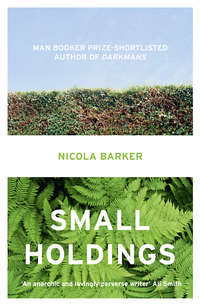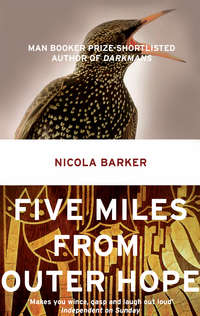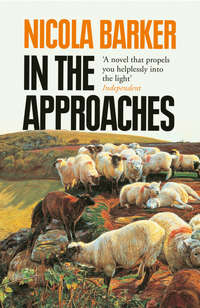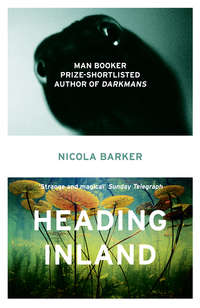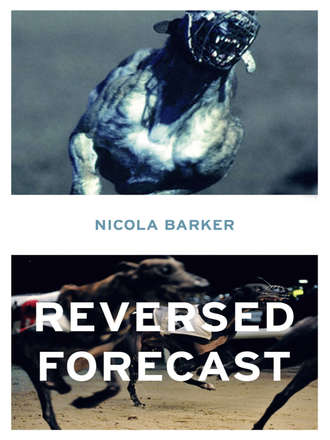
Полная версия
Reversed Forecast

NICOLA BARKER
Reversed Forecast

Dedication
For Ben Thompson,
who’s always liked a bit of a flutter
Contents
Cover
Title page
Dedication
One
At night she breathed through her mouth, which would have…
Two
When younger, Sylvia had been something of a diversion, a…
Three
‘How long have you been waiting?’
Four
Sam was peering through the kitchen window, trying to see…
Five
Vincent had been staring at his hands with unswerving concentration…
Six
Because he had forced himself to await a precise time…
Seven
Vincent opened his eyes. Black. He turned his head to…
Eight
Ruby unlocked the door and automatically reached out her hand…
Nine
Samantha stayed out all Saturday night and returned to the…
Ten
Ruby awoke to the sound of the telephone ringing. She…
Eleven
There was a painting in the living-room, a portrait, that…
Twelve
Connor woke Sam by kissing her ribs and her belly,…
Thirteen
Sylvia stood by the window. The curtains closed behind her.
Fourteen
What the hell had happened? A day of nagging, an…
Fifteen
What time was it? Four a.m.?
Sixteen
When Brera found Sylvia early on Saturday morning, she was…
About the author
Other books by Nicola Barker
Praise
Copyright
About the Publisher
ONE
At night she breathed through her mouth, which would have been fine, if unerotic, except for the fact that her loose lips and sagging tongue spilled out copious quantities of saliva on to her pillow. Sometimes she woke up in the morning to find that the side of her mouth and chin, as well as portions of her lower cheek, had become damp and chapped from her sloppy expulsions.
She slept on her stomach - her breasts, soft pillows; her face, crushed against the bedclothes, misshapen by sleep, like the face of a pug, a boxer or a pekinese: inelegant but charming.
This morning - a Saturday - too, too early; she slept and she dreamed. In her dream she saw the wings of a large black bird. Some people are frightened by wings, she thought. And feathers. Some people are afraid of moths. The way they flutter. This fear - she didn’t know the word for it - a nameless fear.
One instant the bird was at her shoulder, but the next it was outside her window, holding on to the sill with its strong claws, tapping, tapping.
Christ! she thought, suddenly feeling her body, her face, crashing into consciousness. Something is there at the window.
Ruby turned over and tried to open her eyes, both still gummed up with remnants of liquid eye-liner and mascara. She lifted a warm hand to wipe them clear, but this rapid movement, the whiteness of motion from her bleached hair, her pale skin, made the bird - if indeed it was a bird - fall from the sill, as though shot by an arrow of whiteness, a white lightning. When her eyes could properly focus, all she could see through her tiny bedroom window was a pinkish hue, reflected from wall to wall on the buildings outside - diluted light like a weak pink gin. She sniffed, still thinking of the bird. ‘It was probably only a pigeon,’ she said, calming herself, then she opened her eyes wider, registered the reddish atmosphere outside and muttered, ‘Bugger. It’s going to rain.’
She turned over, relaxed, opened her mouth to inhale, and in a single breath was gone.
It didn’t rain immediately. Several miles away a small dark woman stood alone on an open piece of roof-scape. She was still, rooted, like a tree, but her leaves were feathers, which quivered and vibrated in the slow, smouldering, morning light. The mass of birds on her outstretched arms were shrill, excitable, ecstatic, and called, ‘Sylvia! Sylvia! Sylvia!’
They were heavy, but Sylvia waited, remaining benign and impassive until one, last bird had arrived. It landed on her shoulder, gently brushing her cheek with its great black wing.
‘Hello,’ she said quietly, her voice low and rasping. ‘I could see you coming from miles away. A minute ago you were only a tiny speck on the horizon.’
‘Cor!’ it replied, tipping its head, fixing her with a single, black eye.
She grinned and then dropped her arms, feeling the weight of many birds instantly lift, turning her head, hearing the whirrrr of their wings as she watched them ascend.
At ten-forty-five, Ruby ran across Wardour Street and made her way down towards the main bulk of the Berwick Street fruit market. Here she bought a bag of apples and smiled hello to various stallholders. She was late for work, but didn’t seem concerned. From the far end of the market her peroxide hair was clearly visible amongst the bright cuts and smashes of different fruits - the casualty of colour.
To any incidental observer, standing attentive at the end of the market, watching out for motorbike couriers, the wasps, the fruit skins, Ruby painted a diverting picture.
She’s bold, she’s tall. When the men on the market call her a Big Girl, and they do, she spits out her tongue. Her short, unruly, badly bleached hair initially distracts attention from her large, red lips and black-lined eyes. She never tans, but she does wear tinted make-up to stop her skin from looking too pale, too insipid. She has a long nose which is rounded at the tip - not snub - and which suffers the indignity of a slight dent in the middle. She has a big but good body and her clothes are fashionable but not showy. (This is no place to be showy. Soho is cheap-showy.) She has green eyes and five hooped earrings in each ear. Until recently her nose was pierced too. On the palm of her right hand she has a tattoo, which depicts, somewhat clumsily, a small, blue bird in flight. This doesn’t irritate her too much now - she tries not to regret things from the past - although sometimes it surprises her when she puts out her hand in shops to receive change.
Occasionally, as she walks, the market men send teasing whistles in her direction, which make her smile, check her tights and pull down her skirt. Her skirts are usually short but not excessively so, because her legs, although long, are also thick and muscular. If asked what part of her body she hated most, she would probably slap her thighs. She is resolutely curvy: a pear-shaped peach.
Close up, in focus, beyond the hair, the nose, the thighs, hides another essential, unmistakable, uncosmetic detail. It reveals itself physically, although it is not physical. It shows itself in her half-smiling, bright red, cherry lips. In her eyes, which see everything, are concerned with every small detail. You can hear it in her flat, soft voice. You can tell by the way she holds her arms, loose at her sides, informal and approachable. It hits you. It hurts you.
The main thing about Ruby is that she’s obviously, unashamedly, determinedly nice.
Nice? And what does that mean?
One word. She laughs at it. Trouble.
Dawn was heaving a limp body through the shop doorway and swearing for all she was worth. Ruby paused and watched, unable to gain access while Dawn pushed and shoved. When Dawn paused for a second to draw breath, Ruby asked, ‘What’s he done wrong? He’s just drunk. Leave the poor sod.’
Dawn frowned. ‘Grab his feet will you?’
Ruby ignored her. ‘What’s he done?’
Dawn stepped over him and tried another angle, pulling now instead of pushing. He moved a couple more inches.
‘He stinks. He’s smelling out the fucking shop and he’s putting off the punters.’
Ruby peered into the shop. It was empty. But what did that prove? It was still early. She bent over and perused the man’s face more closely. She recognized him.
‘I’ve taken bets off him before. He’s not doing any harm. Can’t you just leave him?’
‘No.’
Ruby crouched down and tentatively nudged the man’s shoulder. ‘Come on, stand up and get out before she drags you out.’
He half-turned his head and grunted. His eyes were unfocused and he was drooling. She was uncertain what to do. Her impulse was to leave him alone, but Dawn was still pulling his feet from the other end. One of his shoes came off and she threw it into the street. It landed in a puddle next to the flower stall.
‘Go on, Dawn, just leave him. It’s still wet outside and he doesn’t really smell.’
Dawn wasn’t convinced. ‘I’ve rolled him this far,’ she said, ‘and I’m not stopping here.’
The man began a half-hearted attempt to drag himself back into the shop, but collapsed after a couple of seconds. Ruby stood up, sighed, stepped over his body and left Dawn to it.
Jason, the manager, smiled at her through the glass partition and then stood up to unlock the door. He said, ‘There’s no stopping Dawn once she gets going.’
Ruby grimaced. She took off her coat and went into the back kitchen to make a cup of tea.
‘Tea, Jason?’
‘I only refuse blows.’
She plugged in the kettle. After a minute Dawn wandered in.
‘Tea, Dawn?’
‘Nah, I’m on the One-Cals today.’ She opened the fridge and took out a can.
Ruby watched her. ‘Were you early?’
She shrugged. ‘Ten minutes. Jason was late. He’d only just opened up anyway.’
‘I overslept again. I feel like hell.’
‘You look like shit.’
Dawn opened her drink and flounced out, smirking.
Ruby waited for the kettle to boil. She felt bad about the dosser. When things like that happened they could undermine her whole day, and things like that happened all the time. She felt as though she hadn’t had enough sleep, had a slight headache and wasn’t happy at the notion of spending yet another day sitting by her till taking bets, helping Dawn with the clues in her crossword puzzle book.
The only positive aspect to working on a Saturday was the morning coverage of dog racing from Hackney. Sometimes, when she had a day off during the week, she worked as a kennel maid at the Hackney track, parading the dogs before their races and putting them into their traps. It was a good way of earning extra cash, and when Hackney was covered in the shops she had some familiarity with the dogs, the track and the personalities that worked there. It was, at least, a diversion.
The kettle came to the boil and switched itself off. She made the teas and strolled back into the shop just in time to see one of the punters - who was he? not a regular - approach the counter and smash his head into the glass partition next to the pay-out where Dawn had stationed herself and her can of One-Cal.
Ruby had long speculated whether the partition - which extended from the till to the ceiling with only a three-inch gap through which punters could push their betting slips and money - was glass or a type of reinforced plastic. This mystery was immediately resolved. The entire screen, whose purpose was to protect the working section of the shop (but chiefly the money), exploded into motion. It cracked, shattered and fell in a mixture of large random chunks and tiny, pebble-shaped splinters both inwards and outwards.
Ruby slammed down her hot drinks on Jason’s desk and raised her arms over her head, protecting her eyes with her hands.
Jason had half-risen from his swivel chair, which spun behind him like a waltzer. A few of the smaller fragments of glass showered the back of his desk and nestled into the curls of his hair and moustache.
Initially, Dawn had thrown both hands forward, as if to catch the entire partition in her arms, but was now drawing them in again to protect her face and neck from the larger pieces which were descending from above.
Vincent (not a punter, not a regular; merely, for the time being, an aggressor) pulled his head back from the impact of the blow while his face composed itself into a violent snarl, which Ruby felt, in all probability, anticipated further damage. His forehead was cut directly below the hairline and blood was already pouring down to his eyebrows, through the funnel of his frown and on to the bridge of his nose.
After the few seconds of initial shock, Vincent began to scream obscenities at the three people standing behind the betting counter. By now his face was almost entirely awash with blood. Some of it ran on to his lips and into his mouth. He spat it out as he shouted, spraying out rude blood like an aerosol.
Jason ignored his yells and dialled the police. Ruby lowered her arms and glanced sideways at Dawn to check that she was all right. Then she turned towards Vincent. ‘We’re fine, but your head’s all split.’ Vincent squinted at her, surprised at being spoken to.
Jason placed his hand over the mouthpiece of the phone. ‘Is anyone hurt? Dawn? Does he have a gun?’
Dawn shook her head. Small pieces of glass rattled down on to the carpet. She stood up. ‘I don’t think he’s got a gun. He’s too bloody stupid. If he’d had any brains, he’d have worked out that the side door’s still open. He could’ve come straight in.’
She adjusted the collar on her blouse and then stalked off to the toilet.
Vincent had lost his initial impetus. Blood was streaming into his eyes. The first few punters of the morning were coming into the shop and standing around in clusters by the door. Jason picked up his keys and tossed them to Ruby. She caught them and made her way around the counter, encouraging everyone outside. ‘Sorry. Looks like you’re all going to have to find somewhere else to spend your money this morning.’
She grinned to herself. They were bound to close up for the day, and if she could get out quickly, she might be able to make it down to Hackney Wick in time for the second race. They always needed help on a Saturday.
When she closed the door she didn’t lock it. Instead she walked over to Vincent and said quietly, ‘Why don’t you get out now while he’s still on the phone? He’s called the police and they’ll be here any minute.’
Vincent glared at her. He looked like a red gargoyle. ‘I don’t need any favours from you.’
‘Suit yourself.’
She walked back around the counter and into the kitchen, where she moistened one of the cleaner tea-towels in hot water, wrung it out, then returned to the shop and threw it at him. Vincent caught the towel and sank his face into it. Jason had finished with the police and was now deep in conversation with his area manager.
When Vincent lifted his head from the towel, Ruby noted that his face was square-shaped, with generous features but smallish eyes. It was a Celtic face - pale skin, reddish-brown lashes, stubble and brows - but his accent wasn’t Irish or Scottish, only rough and vaguely rural. He was of medium build and stocky. Solid, she thought. And stupid. Like a ginger tom. She said, ‘Some of our other shops don’t have glass screens any more. Maybe you could go into one of those next time.’
He leaned up against the counter and appraised her. ‘I was supposed to be meeting someone in here this morning, but I fell over him outside. He was lying in a pile of old fruit and cardboard. They told me on the stalls that you’d thrown him out.’
I didn’t even do it, she thought; only let it happen.
‘I didn’t do it. Someone else did,’ she said.
He blotted the towel against his forehead. ‘Did you bother to take his pulse? Did you check he wasn’t having a fit?’
Her eyes widened. ‘He wasn’t, was he?’
Vincent smiled. ‘Who’s to say?’
‘He wasn’t, was he?’
‘Fuck you.’
The police arrived, pushed through the door and strolled in.
Ruby held out her hand to Vincent. ‘My name’s Ruby. I’ll try to explain things if you like.’
Vincent slapped the damp, bloodied tea-towel down on her outstretched palm and said calmly, ‘You’ll pay for this.’
She backed off but was not afraid. She was tough enough. He was shorter than her by a couple of inches.
Oh yeah, she thought, walking back into the kitchen to make some more tea. Just another bad dream.
He left cuffed, but quietly.
TWO
When younger, Sylvia had been something of a diversion, a novelty, an idiosyncrasy - eccentric but endearing. Now she’s just a problem. And she knows it. She knows it well, but she doesn’t care.
The general consensus on talent is that it is something that everybody appreciates, something that people want to share. Talent is just another commodity. No matter how obscure the talent may be, it’s powerful, it’s positive, it’s something good.
Sylvia is nineteen. She thinks that she understands most things, and the things she doesn’t understand she knows are of no interest to her. When she was fifteen she looked up the word ‘talent’ in her dictionary and saw that its origin was in the Greek talanton. The rough definition of this particular word was ‘a weight’.
Talent, she decided, isn’t always a good thing. It can’t be. She pictured it as a weight around her neck, something heavy, choking and burdensome. She remembered Bette Davis in Whatever Happened to Baby Jane?
Sylvia is very ill, and it’s all because of the birds. She suffers from a rare condition known as Bird Fanciers’ Lung. This condition is caused by excessive contact with birds, their feathers and their dirt. Eventually you get allergic. Eventually it can kill you.
The first time Sylvia suffered symptoms of this rare disease was at the age of thirteen.
The birds had always loved her, she was always the apple of their beady eyes, but when she reached puberty (she reached it late and never seemed to get over the shock) the birds just couldn’t resist her. She became a magnet for their tiny, fragile, feathery bodies. They simply couldn’t bear to keep away.
And Sylvia grew to love them.
Her relationship with the birds isn’t a silly or a dramatic one. She can’t talk ‘bird’ for example; she certainly isn’t a Dr Dolittle.
This makes her talent somewhat redundant. She can’t put on a show with the birds - a circus show or a freak show. It is simply that they love her and she has grown to love them. Possibly the attraction is just hormonal - hormones are complex things - but possibly not.
Steven John had wasted a good part of the morning driving up and down Mare Street, Hackney, trying to locate the relevant turn off for Jubilee Road. He didn’t know the area well and his sense of direction was abysmal. He’d tried perusing an old, dog-eared copy of the A to Z, but had been unable to work out which way up to hold it, which was left and which was right. Eventually he had managed, through sheer coincidence, to find the right road, the correct building and a handy parking space. The space, he thought; that at least must be a good omen.
Before getting out of his car he straightened his lapels and adjusted his collar.
He looked smart. His clothes were always of a high quality - hand cut - but slightly loud. He had a problem with colour. His suits were invariably too beige or too blue or too black. He usually wore a tie, a silk tie, and today was no exception. Peeking out from the inside pocket of his jacket was a gold-plated Parker pen and matching pencil. He found some difficulty in forming the letters correctly in real ink but preferred the classic charm of an ink pen to the bald, cheap brashness of its modern-day equivalent, the Biro. Biros, in his book, had no style and no class.
Steven John has always believed that the little things in life count. Sometimes he thinks that they count more than the big things. This small, almost mediocre philosophy of life is part of the reason why, in his own eyes, he has always been such an absolute failure. He feels insecure, lacks confidence and is devoid of panache. Even his name - this cuts him to the quick - is like two Christian names jammed gracelessly together. Of course it’s a name that could easily be imagined on the front page of Variety magazine. The kind of name someone on the cabaret circuit might have. The kind of someone who makes a break in the chorus of a West End musical. Probably homosexual.
It was as a consequence of his belief in the importance of detail that Steven resolved, at an early age, to gravitate towards the world of showbiz management. He was not made of the stuff of stardom, he knew this full well, but he was a pretender, a trier, a people person.
He sees himself as a fighter, an endurer, someone who battles manfully against all odds. The fact that he battles, suffers and invariably loses is incidental. He makes a living. Some people, he often thinks, correctly, can’t even do that.
He entered the block of flats and, on discovering no lifts, began to climb the stairs. On reaching the third floor he became aware of a strong, musty flavour in the atmosphere - a smell akin to damp, but stronger. The brickwork was newly painted and the hallways seemed clean and well maintained. He put a hand to his throat and wished he was fitter, that his lean body was more athletic, so he wouldn’t be compelled to breathe in this nastiness so deeply, so completely. He cleared his throat, although this didn’t help matters, then continued his ascent.
The smell grew stronger as he reached the fifth floor. Restraining an impulse to sneeze, he raised his fist and rapped gently on the door of the top flat, which was painted a bright, fresh evergreen.
Within seconds the door was pulled open and Steven beheld Samantha, who was looking absolutely radiant and whose first response to his restrained nod of greeting was to smile and say, ‘We thought you’d gone and stood us up.’
She took hold of his hand and shook it. Steven appreciated this small touch.
‘Come in, we’re just having breakfast. We were waiting for you, but it got so late we’ve already started.’
Her face was like a punch, a slap. She was so perfect that it set his teeth on edge. Like a madonna, a princess. Radiating something - an inexplicable serenity - from her black hair and her black eyes. Everything about her just so. A terrifying neatness, a rightness. Her lips, a cupid’s bow; her lashes, so long that he could have plucked them and used them to string a viola.
He forgot to say anything. He could have apologized for his lateness, but he found it impossible to contain anything else in his mind during that instant but her face - the glow of her. Words melted and turned into honey.
She led him through the flat. He followed, still numbed by her. If you had a relationship with a girl like this, he thought, you’d spend all your time trying to find some one thing wrong with her, and when you found it you’d be devastated.
Sam turned to say something to Steven as she led him along the corridor, and caught him staring at her bottom. She forgave him his indiscretion immediately, expecting no better than this from your average man. Steven blushed and continued to stumble down the corridor behind her, keeping his eyes to himself.
The flat was bright, clean and well decorated, but it stank. Steven couldn’t understand the smell. He was momentarily worried that the smell might be his fault, and furtively checked the base of his shoes before following Sam into the kitchen.
The kitchen was painted a meticulous white and filled with red utensils. Sitting at a large red table in the centre of the room was Sam’s mother, Brera, who was thirty-eight, had long auburn hair, fine features and slightly jutting teeth. She beckoned Steven towards the table without standing up. He found her grandly matriarchal.
The table was set with butter, jam, percolated coffee and a half-eaten plate of hot croissants. Steven noticed four settings and hesitated over where to sit. ‘You’ve not gone to all this trouble on my account?’



